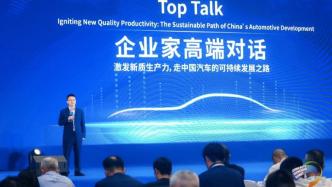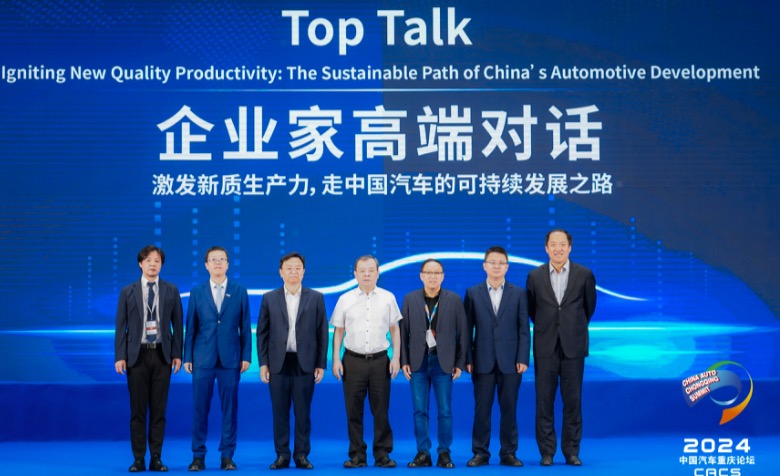
"New quality productivity" is a very new term, but its implementation is inseparable from technological innovation, talent training, model reform and other aspects.
On the second day of the China Automotive Chongqing Forum, the "veterans" of the automotive industry talked about the new quality of productivity in their eyes. Talking about innovation will lead to talking about competition, and talking about competition will lead back to "volume".

BYD Chairman Wang Chuanfu said at the forum that the current auto industry is "competitive in price, technology, scale, and now traffic, the boss's traffic, etc." In his view, "competitiveness" is actually a kind of competition and the essence of the market economy. He directly stated that "the core of the market economy is competition, and market competition is an economy of surplus. Only when there is surplus can there be competition, and only competition can produce prosperity." He believes that all entrepreneurs must embrace and participate in this "competitiveness", embrace this kind of competition, stand out in the competition, and contribute to the country.
When talking about new productivity, Wang Chuanfu said that the core is innovation. He believes that the replacement of traditional fuel vehicles by new energy vehicles is an inevitable trend and is unstoppable. "The core of this change is the replacement of traditional fuel vehicles by new energy vehicles, which is actually a technological revolution." Wang Chuanfu's point of view actually answered the topic of "Can oil and electricity coexist" on the first day of the forum.
Specifically, Wang Chuanfu believes that talent is the foundation of innovation, especially in the field of new energy vehicles, which involves many talents in batteries, motors, electronic controls, and engineering semiconductors. BYD currently has about 100,000 engineers.
In addition, Wang Chuanfu believes that the ability to vertically integrate the industrial chain is also a "new quality of productivity." He said that in the traditional automobile era, BBA, GM, and Ford almost manufactured all parts themselves because "too new things are not available." Now in the new energy field, it has returned to the state of the time. The latest three-electric technology cannot be purchased, and BYD makes it all by itself. This allows the company to do better in terms of efficiency and control.
Zhang Xinghai, CEO and Chairman of SERES Group, also talked about integration capabilities. He said that China has currently formed core capabilities in many core technologies such as intelligence, new materials, and advanced manufacturing. He believes that in the era of software-defined cars, suppliers can be integrated and consolidated. "We insist on integration and agglomeration. In the past, there were 300 first-tier suppliers, but now we have integrated them to less than 100. Next, we will further integrate them to 50 first-tier suppliers. Only software cars can do this." Zhang Xinghai said.
Talking about "roll", Zhang Xinghai said that if you want to roll, you have to roll out value. If you talk about service, you have to roll out the user experience. From the perspective of the industry, you have to roll out the technological upgrade and iteration of the industry.
In the vigorous transformation process of the automobile industry, foreign capital has a weak presence. Even Toyota, the world's number one auto sales company, faces huge competition pressure in the Chinese market.
However, this does not mean that they are indifferent - Toyota has also cooperated with Chinese industry, academia and research circles to jointly develop electric vehicles with Chinese automakers. When Toyota executives said last year that "joint ventures are not a sign of backwardness", the outside world could sense how strong the desire of these old traditional automakers is to change, and how helpless they are due to bottlenecks in structure and efficiency.
At the Chongqing Forum, Liu Peng, deputy general manager of Toyota Motor China Investment Co., Ltd., as a representative of the joint venture automaker, talked about his views on new quality productivity.
From the perspective of Chinese users, Toyota is not very efficient in the fields of intelligence and electrification, and cannot be said to be leading in the new quality of productivity. In the past, from lean production to Toyota work methods, they were all "new quality of productivity" passed down by word of mouth by global automakers at that time.
In fact, in order to adapt to the changes in China, Toyota Motor R&D Center was renamed Toyota Intelligent Electric Vehicle R&D Center in August last year. The purpose of the name change is to transform the consciousness and working methods. From the previous global models imported into China for localized adjustment, it has been transformed into Toyota developing electric vehicles in China and feeding back to the global automobile development.
Liu Peng believes that diversified technology paths are needed at this stage, including the four major technologies of BEV, HEV, PHEV, and RCEV, to provide better options for customers in different regions and environments.
In Liu Peng's view, in the period of great change recognized by the industry, while striding forward with new quality productivity, we should think about problems from the perspective of different user needs around the world and China. Toyota will continue to seek orderly improvement of technology and brand value from the perspective of industry development, user first, and continuous improvement, and strive to run far, walk steadily, and achieve sustainable development.